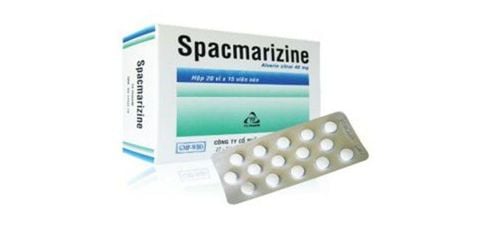This is an automatically translated article.
Posted by Master, Doctor Mai Vien Phuong - Department of Examination & Internal Medicine - Vinmec Central Park International General Hospital
Almost everyone experiences stomach pain from gastritis, an inflammation of the colon from time to time. Common symptoms include nausea, indigestion, vomiting, bloating, diarrhea, or constipation. There are many potential reasons for abdominal pain, and treatments vary depending on the underlying cause.
If you live in an area with good medical conditions, you can go to the doctor and buy medicines for treatment. However, what if you are in remote rural areas, unable to access the health system? Thankfully, many common around-the-house foods can ease an upset stomach and help you feel better, faster.
1. Ginger Can Relieve Nausea And Vomiting
Nausea and vomiting are common symptoms of abdominal pain.
Ginger, an edible root fragrant with bright yellow flesh, is often used as a natural remedy for both of these symptoms. Ginger can be enjoyed raw, cooked, steeped in hot water or as a supplement and is effective in all forms.
Women experience morning sickness, a type of nausea and vomiting that can occur during pregnancy. A review of 6 studies including more than 500 pregnant women found that taking 1 gram of ginger per day was associated with a 5-fold reduction in nausea and vomiting during pregnancy.
Ginger is also helpful for people undergoing chemotherapy or major surgery, as these treatments can cause severe nausea and vomiting. Taking 1 gram of ginger daily, before undergoing chemotherapy or surgery, can significantly reduce the severity of these symptoms.
Ginger can even be used as a natural remedy for motion sickness. When taken first, it can help reduce the intensity of nausea symptoms and speed recovery.
How this works is still not completely understood, but it is hypothesized that ginger regulates the nervous system that transmits signals in the stomach and speeds up gastric emptying, thereby reducing nausea and vomiting.
Eating is generally considered safe, but heartburn, upset stomach and diarrhea can occur with doses above 5 grams per day.
Ginger can help with nausea and vomiting, especially when related to pregnancy, surgery, chemotherapy or motion sickness.

2. Chamomile can relieve vomiting and soothe intestinal discomfort
Chamomile, an herbal plant with small white flowers, is a traditional remedy for colic. Chamomile flowers can be dried and made into tea or taken as a supplement.
Historically, chamomile has been used for a variety of intestinal problems, including bloating, indigestion, diarrhea, nausea, and vomiting. However, despite its widespread use, There is only a limited amount of research supporting its effectiveness for digestive problems.
One small study found that a chamomile supplement reduced the severity of vomiting after chemotherapy treatment, but it's not yet clear if it has the same effect on other types of vomiting. No. Chamomile is also commonly used in herbal supplements to help relieve indigestion, gas, bloating and diarrhea, as well as colic in babies.
However, because chamomile is combined with many other herbs in these recipes, it is difficult to tell if the beneficial effects are from the chamomile or from a combination of other herbs.
Although chamomile's gut-soothing effects are widely recognized, research has yet to show how it helps with colic.
3. Peppermint Can Relieve Irritable Bowel Syndrome Symptoms
For some people, abdominal pain is caused by irritable bowel syndrome, or IBS. IBS is a chronic intestinal disorder that can cause stomach pain, bloating, constipation, and diarrhea.
While IBS can be difficult to manage, studies show that peppermint can help relieve these uncomfortable symptoms. Taking peppermint oil capsules daily for at least two weeks can significantly reduce stomach pain, bloating, and diarrhea in adults with IBS.
Researchers believe that menthol works by relaxing the muscles in the digestive tract, reducing the severity of intestinal spasms that can cause pain and diarrhea. While research is promising, additional studies are needed to determine if mint leaves or peppermint tea have the same therapeutic effects.
Mint is safe for most people, but caution should be exercised in people with severe reflux, herniated discs, kidney stones, or liver and gallbladder disorders, as it can worsen these conditions

4. Licorice can relieve indigestion and may help prevent stomach ulcers
Licorice is a popular remedy for indigestion and can also prevent painful stomach ulcers.
Traditionally, licorice root is consumed whole. Today, it is most commonly used in the form of a supplement known as defatted licorice (DGL).
DGL is preferred over common licorice root because it no longer contains glycyrrhizin, a natural chemical found in licorice that can cause fluid imbalance, high blood pressure, and low potassium levels when consumed in amounts big.
Animal and test-tube studies show that DGL soothes stomach pain and discomfort by reducing inflammation of the stomach lining and increasing mucus production to protect tissues from stomach acid. This can be especially helpful for people with abdominal pain caused by excessive stomach acid or acid reflux.
DGL supplements can also help relieve stomach pain and indigestion caused by stomach ulcers caused by an overgrowth of H. pylori bacteria.
Some studies have shown that DGL supplements can eliminate H. pylori overgrowth, reduce symptoms, and even promote healing of stomach ulcers.
Overall, licorice is an herb that calms the gut and can help reduce inflammation and infections that can contribute to stomach upset.
5. Papaya can improve digestion and may be effective against ulcers and parasites
Papaya, also known as papaya, is a sweet, orange-colored tropical fruit that is sometimes used as a natural remedy for indigestion. Papaya contains papain, a powerful enzyme that helps break down proteins in the foods you eat, making them easier to digest and absorb.
Some people don't produce enough natural enzymes to fully digest their food, so consuming enzyme supplements, like papain, may help relieve their indigestion symptoms.
There are not many studies on the benefits of papain, but at least one study shows that regularly taking papaya concentrate reduces constipation and bloating in adults.
Papaya is also used in some West African countries as a traditional remedy for stomach ulcers. Some studies have shown that the seeds actually have anti-parasitic properties and can increase the number of parasites passed through the stool of children.
Papaya concentrate can help relieve constipation, bloating and stomach ulcers, while the seeds can help get rid of intestinal parasites.

Conclusion
There are many foods that can help relieve abdominal pain.
Herbs and spices like ginger, chamomile, mint and licorice have natural stomach-soothing properties, while fruits like papaya and green bananas can improve digestion.
Avoiding high-FODMAP foods helps some people get rid of gas, bloating, and diarrhea, while probiotic foods like yogurt and kefir can help regulate bowel movements.
When abdominal pain is accompanied by vomiting or diarrhea, remember to drink water and replenish electrolytes. You may also find bland carbohydrates easier to reduce.
Although you may feel an upset stomach from time to time, eating these foods can help you feel better and on your way to recovery.
Currently, Vinmec International General Hospital is a prestigious address trusted by many patients in performing diagnostic techniques for digestive diseases, short bowel syndrome, chronic diarrhea, Crohn's disease , misplaced gastric mucosa in the esophagus, reflux esophagitis...
Vinmec Hospital with modern facilities and equipment and a team of experienced experts, always dedicated to treatment patients, customers can rest assured with gastroscopy and esophagoscopy services at Vinmec International General Hospital.
Please dial HOTLINE for more information or register for an appointment HERE. Download MyVinmec app to make appointments faster and to manage your bookings easily.














